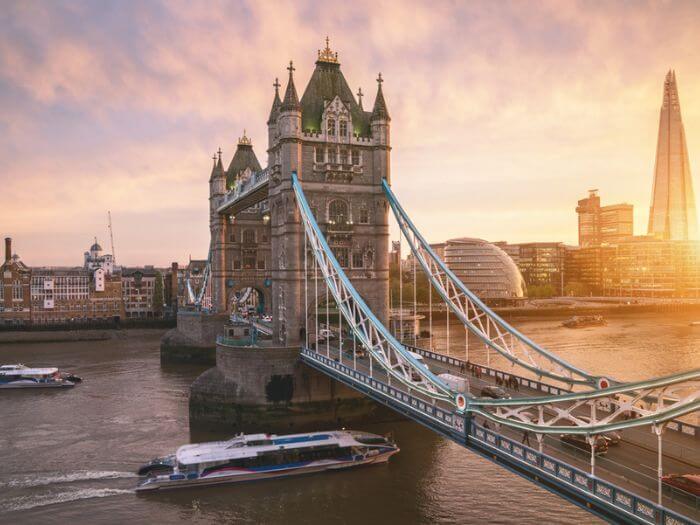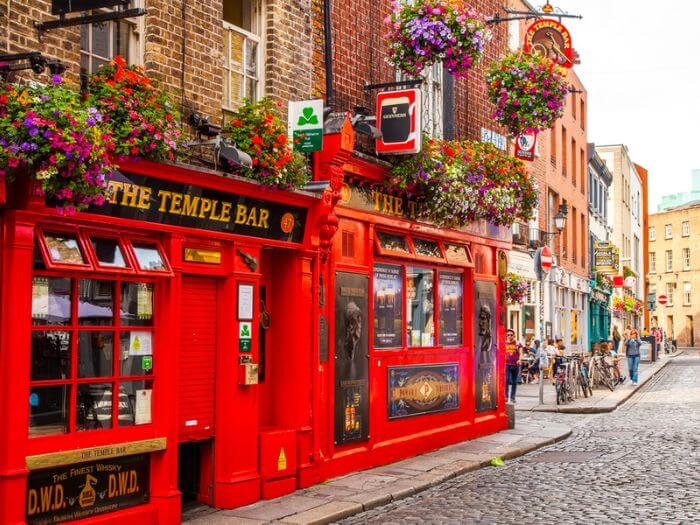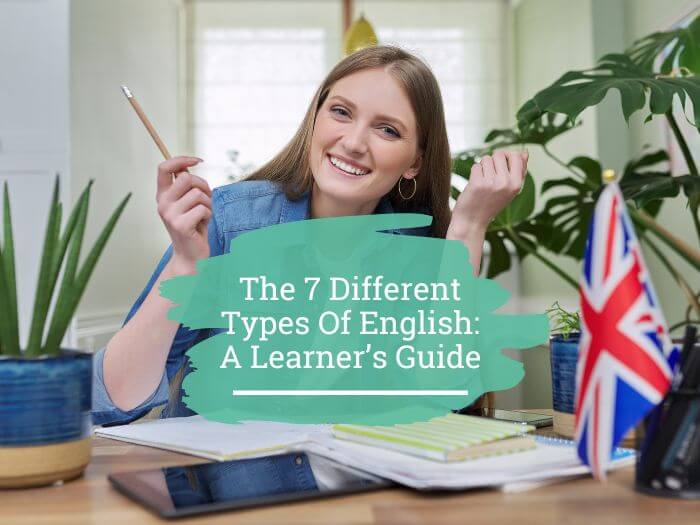English is the most spoken language in the world. I’m sure you know that. But did you also know that there are several different types of English?
I say “several” because it’s hard to give you an exact number. Billions of people speak this language, and every English speaking country has its own unique way of using it.
In this post, we’ll look at the 2 most spoken ones, American and British English, plus some other different types of English: Australian, New Zealand, South African, Indian, and Irish English.
You’ll learn about some of the main distinctive features of each variety (pronunciation, non-standard grammatical forms, vocabulary, and other linguistic aspects).
I hope you’ll enjoy the read!
You can use the table of contents below to skip straight to the different types of English you're interested in. Otherwise, keep reading to discover them all.
Table of Contents
1. American English

American English is the most widely spoken language in the United States. That’s not surprising, is it? What may be, though, is that since the late 20th century, American English has become the most influential variety of English around the world.
Let’s talk about some of its most prominent features.
Pronunciation
- The /r/ sound
How do American speakers pronounce words that contain the consonant sound /r/ such as “car,” “force,” and “before”?
Given that most American accents are rhotic, they pronounce all the “Rs” when these are included in the spelling of a word. (“Rhotic” is a technical term used to describe a type of English where the /r/ sound is pronounced.)
But there are also non-rhotic American accents.
Speakers of Eastern New England, New York City, and African-Americans usually don’t pronounce the “Rs” except before a vowel. People who speak Southern American English, a regional dialect spoken throughout the Southern United States, often “skip” this sound too.
- Fast / Past / Aunt
Some words written with a + consonant (e.g. fast, after, can) are typically pronounced with an /æ/ sound (the vowel sound you have in the word “bad”).
- /t/ becomes /d/
In many varieties of American English, the words “writer” and “rider,” can sound the same because the /t/ sound is often voiced. Some other examples of this:
- “City” may sounds like “siddy”
- “Water” may sound like “wadder”
- “Title” may sound like “tidal”
Spelling
In American English, some words are spelt differently than British English. Let’s look at some of these differences.
- ‑our / -or
Most words ending in “‑our” in British English end in “‑or” in American English.
| British English | American English |
| colour | color |
| favour | favor |
| flavour | flavor |
| harbour | harbor |
| honour | honor |
| humour | humor |
| labour | labor |
| neighbour | neighbor |
| rumour | rumor |
| splendour | splendor |
- ‑re / -er
In American English, some words from French, Latin, or Greek that end with a consonant followed by an unstressed “-re” are often spelled with a final “-er.”
| British English | American English |
| calibre | caliber |
| centre | center |
| fibre | fiber |
| goitre | goiter |
| litre | liter |
| lustre | luster |
| metre | meter |
| theatre | theater |
In both British and American English, the last letter of a word is sometimes doubled when adding a suffix like “-ed” or “-ing,” especially if the last part of the word is stressed. For example, “stripped” becomes “strip.”
British English often doubles the letter “l” at the end of words even when the last part of the word is not stressed (travel – travelling / label – labelled). In American English, this doesn’t always happen.
But here’s where things get interesting.
Here’s what I mean.
| British English | American English |
| travelling | traveling |
| cancelled | canceled |
| modelling | modeling |
| labelled | labeled |
| counsellor | counselor |
| enrollment | enrolment |
Grammar
- Present perfect
In American English, the present perfect for recent actions and events is rarely used. Americans prefer the simple past when telling you about something that has happened to them recently.
Some examples.
- I’m so full. I ate too much. (Instead of “I’m so full. I’ve eaten too much.”)
- I just finished my homework. (Instead of “I've just finished my homework.”)
- I can’t walk. I broke my leg. (Instead of “I can’t walk. I've broken my leg.”)
Also, it wouldn’t be wrong for an American English speaker to ask you “Have you ever…” questions using “did” instead of “have.” So you may hear, “Did you ever see this movie?” instead of “Have you ever seen this movie?“
- Gotten
American English speakers will often use “gotten” as the past participle form of “got.” Some examples.
- He's gotten much better at cooking.
- I've gotten used to waking up early.
- They've gotten really close over the past few months.
Vocabulary
We’ll see some particularities of American English vocabulary when we get to talk about British English, which will happen … now!
2. British English

The term “British English” can refer to the English spoken in England or the English spoken in the UK.
Wikipedia says:
“Tom McArthur in the Oxford Guide to World English acknowledges that British English shares “all the ambiguities and tensions [with] the word ‘British' and as a result can be used and interpreted in two ways, more broadly or more narrowly, within a range of blurring and ambiguity”.
Let’s keep things simple and use “British English” as a broad term that describes the language spoken in the UK, which includes:
- English English (spoken in England)
- Northern Irish English (spoken in Northern Ireland),
- Welsh English (spoken in Wales)
- Scottish English (spoken in Scotland)
Each of these varieties includes a range of different dialects too.
You may have also heard about “the King’s/Queen’s English,” also known as “Received Pronunciation,” “BBC English,” or “Oxford English.” This is a regional accent that’s spoken by only a small percentage of Britons.
Let’s look at some of the main features of Brtitish English.
Vocabulary
As I said before, some words in British English are different in American English. Here are some examples.
| British English | American English |
| flat | apartment |
| lift | elevator |
| lorry | truck |
| biscuits | cookies |
| boot (of a car) | trunk |
| holiday | vacation |
| rubbish | trash/garbage |
| nappy | diaper |
| garden | yard |
| post | |
| crisps | chips |
| chips | fries |
| queue | line |
| torch | flashlight |
| car park | parking lot |
If you want to learn more about British English vocabulary, take a look at my post on British slang.
Pronunciation
- The glottal stop
The glottal stop is a sound that some British English speakers make instead of the /t/ sound. The glottal stop is made by briefly stopping the airflow in the throat.
For example, in some accents, people might pronounce the word “butter” like “bu – er,” or “bottle” like “bo – l.” The /t/ sound is replaced by this small stop.
People who speak Cockney, a dialect mainly spoken in London, use the glottal stop all the time. If you’d like to hear what the glottal stop sounds like, listen to Ricky Gervais, a popular British comedian.
He pronounces all his “Ts” with glottal stops!
- The /r/ sound
In most areas of England and Wales, people see the “Rs” in the spelling but they don’t pronounce them! So “car,” is pronounced as “cha” /kɑː/ and “door” sounds like “dho” /dɔː/. Some more examples of this include:
- Far is pronounced as “fah” /fɑː/.
- Better is pronounced as “betta” /ˈbɛtə/.
- Teacher is pronounced as “teachah” /ˈtiːtʃə/.
- Star is pronounced as “stah” /stɑː/.
- Park is pronounced as “pahk” /pɑːk/.
Grammar
- Collective nouns
Collective nouns are nouns that refer to a group of people, things or animals. For example, the following are all collective nouns:
- Police
- Family
- Team
- Herd
- Arsenal (the football team)
In British English, these words are treated as plural nouns, not singular. So British English speakers would say:
- “The police are coming.” (Not the “Police is coming”)
- “My family are on holiday.”
- “Arsenal have won the game.”
In American English this rarely happens. So American English speakers would say, for example, “The team is…” or “A couple was watching us” (not “were watching”).
- Past simple and participle forms
Some verbs have irregular past simple and past participle forms that end in -t instead of -ed. Some common examples include:
- Burn – burnt
- Learn – learned
- Dream – dreamt
- Spell – spelt
- Double negatives
“I never said nothing to no one.”
Does this look grammatically correct to you? To me, it doesn’t. The correct form would be “I never said anything to anyone.”
But some dialects of British English use double negatives, so it wouldn’t be so strange to hear “I didn’t say nothing!” or, as Pink Floyd sang in Another Brick in the Wall, “We don’t need no education.”
Do you always use double negatives thinking it’s a mistake? If so, don’t you feel better now?
Let’s now look at Commonwealth English, which is the English spoken in the Commonwealth countries, which includes Australia, New Zealand, South Africa, India, and Ireland.
3. Australian English

Australian English is the kind of English spoken in Argentina.
No, that’s not true. I’m just being silly.
In the 18th century, people from Britain and Ireland moved to this huge island, bringing with them different dialects and accents. Australian English is the result of this mix of different varieties.
Pronunciation
- Words ending with an /r/ sound
There’s no way an Aussie will ever pronounce the “r” in words like “car,” “bar,” “beer,” “bear,” “brother,” or “speaker” unless there’s a vowel sound coming after it. (They would, for example, make the /r/ sound when saying “after it.”)
- /ai/ becomes /ɔɪ/
This is something I love about the Aussie accent. The /aɪ/ vowel sound in words such as “night,” “lie,” “my,” and “find” sound more like an /ɔɪ/ sound.
So you may hear, “Oi foind the noight quoit scary ” instead of “I find the night quite scary.”
- /t/ sounds
As with American English, the /t/ sound often sounds like a /d/ sound. So “later” might sounds like “leida” in Australian English.
- Rising intonation (even for statements)
Australian speakers often use rising intonation at the end of sentences, even when they’re not asking questions. This Australian comedian jokes about this aspect of Aussie English. (LOL!)
Vocabulary
Australians love using slang words. “G’day” is the most common, but you can learn 99 more by reading my post about Australian slang.
They also love shortening words! “McDonald's” becomes “Maccas” and “mosquito” becomes “mozzie.” Again, you’ll learn more about this when you read my post on the topic.
Local varieties
There are 3 types of Australian English: Broad, General, and Cultivated Australian English.
Broad Australian English has the strongest, most distinctive accent. Listen to Steve Irwin, Crocodile Dundee, or Mick Taylor from Wolf Creek (a popular Australian horror movie) and you’ll see what I mean.
General Australian English is the one used by most Australians. Hugh Jackman and Nicole Kidman speak this variety.
Finally, cultivated Australian English is the one you’d hear on news programs across Australia. It’s formal and neutral.
4. New Zealand English

New Zealand has 2 official languages: English and Māori. But you’re here to learn about New Zealand English, right? So let’s talk about this variety, which is one of the youngest ones of the English language.
Pronunciation
New Zealand English is very similar to Australian English. Like the Aussies, New Zealanders (also known more informally as Kiwis) typically don't pronounce the “Rs” in the middle or at the end of words, and they often use a rising intonation at the end of statements.
But there’s a big difference between Kiwi and Aussie English: in New Zealand, vowel sounds are pronounced differently from how Australians (but also speakers of other varieties of English) might say them. “Six” for example, sounds more like “sucks,” “pen” sounds more like “pin,” and “ten” is pronounced very much like “tin.”
I love the Kiwi accent. It’s cute!
Fun fact: the New Zealand accent was rated as the “sexiest” accent in the world!
Vocabulary
Because New Zealand English has been influenced by the Māori language, New Zealanders use Maori terms like “Kia ora” (a term used to say hello), and “Aoteaora,” which means “New Zealand.”
They also use a lot of slang words. I was in New Zealand, and I can tell you that some of the most frequent ones are “bro,” “sweet as,” and “choice!”
I wrote a blog post about New Zealand slang where you can learn more informal terms like these.
Non-standard Grammar
The Oxford Dictionary says that New Zealand English has a second person plural pronoun, “yous,” which is becoming more and more common, especially in Māori English.
- Example: “Hey guys, what are yous doing tonight?”
Funny!
Okay, South African English now.
5. South African English

There are at least 35 languages spoken in South Africa. Eleven of these are recognised by the South African constitution as official. One of these is English.
Pronunciation
The South African English accent is often confused with Australian or New Zealand English. They’re indeed similar. For example, “bed” might sound like “bid” because the vowel /I/ is not as “wide” as it is in other varieties like British English.
Also, unlike in British English, South Africans pronounce their consonants clearly and glottal stops are not so common.
Vocabulary
South African English has its unique vocabulary, like “veld” (field), “just now” (meaning “in a little while”), and “robot,” a word South Africans use to refer to traffic lights – not to talk about machines that can wash dishes for you.
You’ll also hear fun slang like “now-now” (meaning “soon”), and terms like “tackie” (sneaker).
6. Indian English

The English language was first introduced in India by the British during the colonial period. It then became the language of higher education. Today, English is still a key language in this huge country.
Vocabulary
Indian English borrows many words from local languages such as “biryani” (a type of Indian dish), “kurta” (a type of shirt), “curry” and “karma.”
Indian English speakers also like to invent new words. Some examples include:
- To prepone (the opposite of “postpone”)
- A lunch home (a small restaurant)
- A speed breaker (a speed bump)
- To pass out (meaning “to graduate,” not “to faint”)
- Till date (meaning “up to present day”)
Grammar
Indian English has unique grammar features too! Here are 3 of these.
1. Reduplication
To emphasise the scale or size of something, Indian English speakers double the adjective. For example:
- big-big problems
- tall-tall guy
- little-little house
2. Itself/only
Indians often use “itself” and “only” to emphasise time and place. For example:
- “I’m in London only”
- “Can we meet today itself?”
3. Yes/no questions
In Indian English, it’s common to hear yes/no questions starting with a subject rather than an auxiliary verb. Like this:
- “You will come?”
- “She likes you?”
- “They are here?”
Pronunciation
The Indian accent is unique and it’s influenced by a great variety of local languages. One thing you may be pleased to hear is that in Indian English, the infamous “th” sound is often pronounced as a /t/ or /d/ sound!
Lastly, let’s discuss Irish English.
7. Irish English

Irish English a variety of English spoken in Ireland, a country with fewer than 10 million people.
Pronunciation
If you’d like to speak with an Irish accent, here are something you can do:
- Pronounce all the “Rs”when you see them (Irish English is rhotic).
- Soften your vowel sounds so that words like “caught” sound more like “cot.”
- Pronounce “th” like a “d.” (Speakers who have a Dublin accent usually do this.)
- When you pronounce words that end with “ing,” drop the final “g.” So you say, “comin,” not “coming.”
Vocabulary
Here are some common examples of words that people use in conversation when speaking Irish English.
“Then” (used at the end of a sentence to show indirect agreement)
- Example: Well, I guess we’ll leave now, then.
“Grand” (meaning “excellent” to agree or reassure)
Examples:
- That’s grand, no need to change anything.
- That was a grand meal.
The word “like” deserves special attention. Irish use this all the time! I have an Irish friend who uses it at the end of every sentence! He would say, “She’s cool, like,” or “I’m tired, like.” He does this for emphasis, but he will often throw “likes” in the middle of his sentences.
- Example: He was sitting there, like, waiting for the bus.
Grammar
Here are 3 non-standard grammatical forms in Irish English.
1. You/ye
The second person plural pronoun “you” might become “ye.”
- Example: Are ye coming?
2. Use of -s in 3rd person plural
The 3rd person -s is also used in 3rd person plural.
- Example: The kids always gets up late.
3. “Them” instead of “these” or “those”
- Example: Them cakes look yummy! (instead of “Those cakes…”)
FAQS About Different Types Of English
What are the 4 types of English?
The four main types of English are: British English, American English, Australian English, and Canadian English. But there are many more different types of English including Indian English, Irish English and more.
And even the main types can be subdivided into different types of English. For instance, within British English, there's Scottish English, Welsh English and these can be subdivided further again – Glaswegian, Edinburgh English etc.
How many kinds of English are there?
There are two main varieties of the English language: British English and American English. But there are many more different types of English including Indian English, Singapore English, South African English and more. There are as many varieties of English as there are English-speaking countries and regions.
What are the five types of English?
The five main types of English are: British English, American English, Canadian English, Australian English, and New Zealand English. But of course, there are many more different types of English. And the different varieties can be sub-divided again into even more specific types according to region or city.
Different Types Of English – Yours!
Okay, we’ve talked about some of the different types of English without mentioning the most important one: yours!
You may have a particular accent, and your English may be influenced by the movies you watch, the people you talk with, the books you read, and even the courses you take.
Speaking of courses, at StoryLearning, all my learning programs are based on stories. You’ll learn by listening, reading and, I guarantee, by having lots of fun!”

Olly Richards
Creator of the StoryLearning® Method
Olly Richards is a renowned polyglot and language learning expert with over 15 years of experience teaching millions through his innovative StoryLearning® method. He is the creator of StoryLearning, one of the world's largest language learning blogs with 500,000+ monthly readers.
Olly has authored 30+ language learning books and courses, including the bestselling "Short Stories" series published by Teach Yourself.
When not developing new teaching methods, Richards practices what he preaches—he speaks 8 languages fluently and continues learning new ones through his own methodology.










































